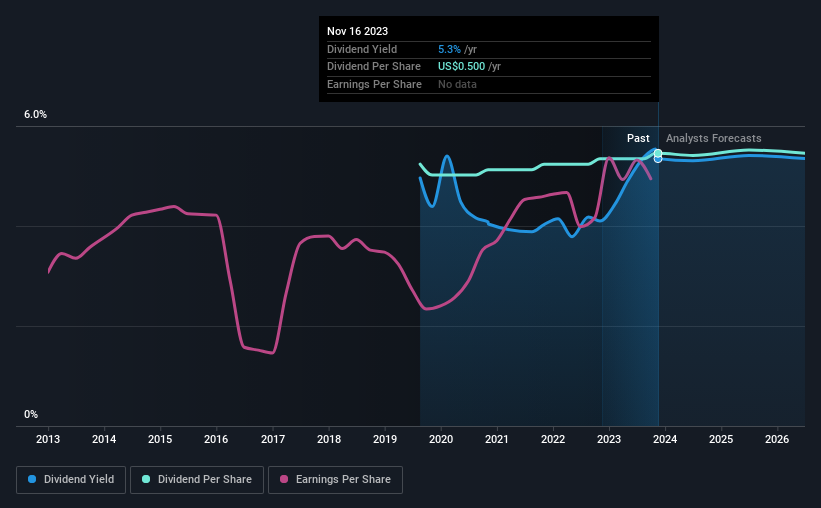Four Days Left To Buy Amcor plc (NYSE:AMCR) Before The Ex-Dividend Date
Amcor plc (NYSE:AMCR) is about to trade ex-dividend in the next 4 days. The ex-dividend date is one business day before the record date, which is the cut-off date for shareholders to be present on the company's books to be eligible for a dividend payment. The ex-dividend date is important because any transaction on a stock needs to have been settled before the record date in order to be eligible for a dividend. This means that investors who purchase Amcor's shares on or after the 21st of November will not receive the dividend, which will be paid on the 12th of December.
The company's upcoming dividend is US$0.13 a share, following on from the last 12 months, when the company distributed a total of US$0.50 per share to shareholders. Last year's total dividend payments show that Amcor has a trailing yield of 5.3% on the current share price of $9.35. We love seeing companies pay a dividend, but it's also important to be sure that laying the golden eggs isn't going to kill our golden goose! So we need to check whether the dividend payments are covered, and if earnings are growing.
View our latest analysis for Amcor
If a company pays out more in dividends than it earned, then the dividend might become unsustainable - hardly an ideal situation. Amcor paid out 74% of its earnings to investors last year, a normal payout level for most businesses. Yet cash flow is typically more important than profit for assessing dividend sustainability, so we should always check if the company generated enough cash to afford its dividend. It paid out 81% of its free cash flow as dividends, which is within usual limits but will limit the company's ability to lift the dividend if there's no growth.
It's positive to see that Amcor's dividend is covered by both profits and cash flow, since this is generally a sign that the dividend is sustainable, and a lower payout ratio usually suggests a greater margin of safety before the dividend gets cut.
Click here to see the company's payout ratio, plus analyst estimates of its future dividends.
Have Earnings And Dividends Been Growing?
Companies with consistently growing earnings per share generally make the best dividend stocks, as they usually find it easier to grow dividends per share. Investors love dividends, so if earnings fall and the dividend is reduced, expect a stock to be sold off heavily at the same time. With that in mind, we're encouraged by the steady growth at Amcor, with earnings per share up 6.0% on average over the last five years. Decent historical earnings per share growth suggests Amcor has been effectively growing value for shareholders. However, it's now paying out more than half its earnings as dividends. If management lifts the payout ratio further, we'd take this as a tacit signal that the company's growth prospects are slowing.
Many investors will assess a company's dividend performance by evaluating how much the dividend payments have changed over time. Amcor has delivered an average of 1.0% per year annual increase in its dividend, based on the past four years of dividend payments.
Final Takeaway
Has Amcor got what it takes to maintain its dividend payments? Earnings per share have been growing modestly and Amcor paid out a bit over half of its earnings and free cash flow last year. Overall we're not hugely bearish on the stock, but there are likely better dividend investments out there.
If you're not too concerned about Amcor's ability to pay dividends, you should still be mindful of some of the other risks that this business faces. We've identified 2 warning signs with Amcor (at least 1 which is a bit unpleasant), and understanding these should be part of your investment process.
If you're in the market for strong dividend payers, we recommend checking our selection of top dividend stocks.
Have feedback on this article? Concerned about the content? Get in touch with us directly. Alternatively, email editorial-team (at) simplywallst.com.
This article by Simply Wall St is general in nature. We provide commentary based on historical data and analyst forecasts only using an unbiased methodology and our articles are not intended to be financial advice. It does not constitute a recommendation to buy or sell any stock, and does not take account of your objectives, or your financial situation. We aim to bring you long-term focused analysis driven by fundamental data. Note that our analysis may not factor in the latest price-sensitive company announcements or qualitative material. Simply Wall St has no position in any stocks mentioned.

